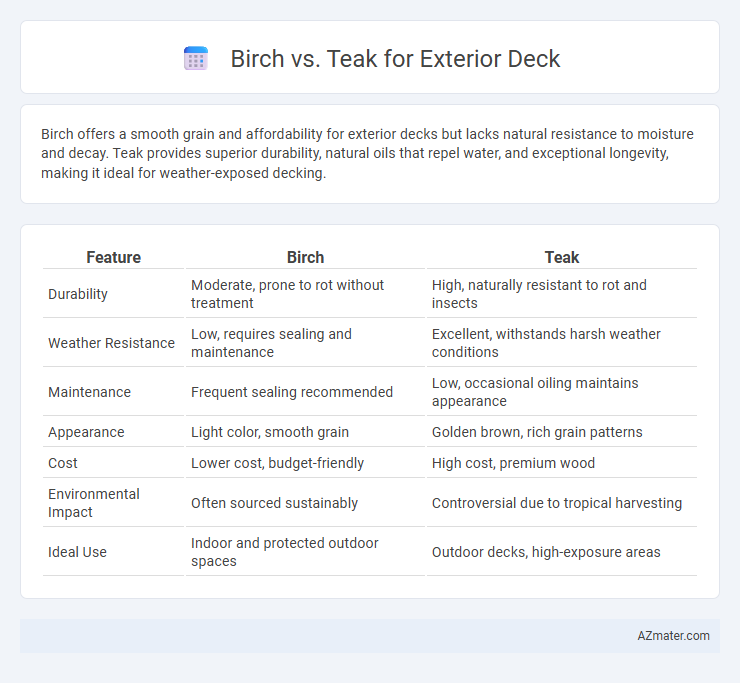Birch offers a smooth grain and affordability for exterior decks but lacks natural resistance to moisture and decay. Teak provides superior durability, natural oils that repel water, and exceptional longevity, making it ideal for weather-exposed decking.
Table of Comparison
| Feature | Birch | Teak |
|---|---|---|
| Durability | Moderate, prone to rot without treatment | High, naturally resistant to rot and insects |
| Weather Resistance | Low, requires sealing and maintenance | Excellent, withstands harsh weather conditions |
| Maintenance | Frequent sealing recommended | Low, occasional oiling maintains appearance |
| Appearance | Light color, smooth grain | Golden brown, rich grain patterns |
| Cost | Lower cost, budget-friendly | High cost, premium wood |
| Environmental Impact | Often sourced sustainably | Controversial due to tropical harvesting |
| Ideal Use | Indoor and protected outdoor spaces | Outdoor decks, high-exposure areas |
Introduction to Birch and Teak for Exterior Decks
Birch offers a smooth, light-colored finish that enhances exterior decks with its fine grain and moderate durability, making it suitable for areas with milder weather conditions. Teak stands out for its exceptional natural oils and dense grain, providing superior resistance to moisture, insects, and decay, ideal for harsh outdoor environments. Both woods present unique aesthetic and performance qualities, influencing their selection based on climate and maintenance preferences for exterior decking projects.
Key Differences Between Birch and Teak Wood
Birch wood is a hardwood with a pale color and fine, uniform grain that offers moderate durability but requires regular sealing for outdoor use, making it less ideal for exterior decking compared to teak. Teak is renowned for its natural oils and dense grain, providing exceptional resistance to moisture, decay, and insect damage, ensuring superior longevity and minimal maintenance on exterior decks. The key differences lie in teak's superior weather resistance and durability, while birch is more affordable but demands more upkeep when exposed to outdoor elements.
Durability in Outdoor Environments
Teak offers superior durability for exterior decks due to its natural oils that resist moisture, decay, and insect damage, making it ideal for harsh outdoor environments. Birch, while hardwood, is less resistant to weathering and requires extensive treatment and maintenance to withstand moisture and prevent rot. In terms of long-term performance and minimal upkeep, teak outperforms birch significantly in outdoor deck durability.
Weather Resistance: Birch vs Teak
Teak outperforms birch in weather resistance for exterior decks due to its natural oil content that repels water, resists rot, and withstands UV damage. Birch, being a hardwood with less natural oil, tends to absorb moisture leading to warping and decay over time when exposed to outdoor elements. Choosing teak ensures a longer-lasting, low-maintenance deck that maintains structural integrity and aesthetic appeal in harsh weather conditions.
Maintenance Requirements and Upkeep
Birch requires more frequent sealing and protective coatings to withstand outdoor elements, as it is less naturally resistant to moisture and insect damage compared to teak. Teak's high natural oil content provides superior durability and resistance to rot, significantly reducing the need for regular maintenance and upkeep. Regular cleaning and occasional oiling are typically sufficient to preserve teak's appearance and structural integrity over time.
Aesthetic Appeal and Grain Patterns
Birch wood features a light, creamy color with a fine, uniform grain that offers a sleek and modern aesthetic for exterior decking, creating a bright and clean appearance. Teak boasts a rich, golden-brown hue with prominent, wavy grain patterns that develop a warm, rustic charm over time, highly valued for its natural beauty and luxurious look. The choice between Birch and Teak for decking depends on whether a lighter, minimalist style or a darker, textured elegance is preferred.
Cost Comparison: Birch and Teak Decking
Birch decking typically costs significantly less than teak, making it a budget-friendly option for exterior decks while still offering decent durability and appearance. Teak is priced higher due to its natural oils, exceptional resistance to weather and insects, and longevity, which often justifies the investment for long-term performance. Cost considerations should include initial purchase price and maintenance expenses, with teak requiring less upkeep but a higher upfront cost compared to birch.
Environmental Impact and Sustainability
Birch decking is often sourced from fast-growing, sustainably managed forests, making it a more environmentally friendly option compared to teak, which is harvested from slower-growing tropical hardwood trees and is frequently associated with deforestation and habitat loss. Birch has a lower carbon footprint due to its quicker regeneration rate and local availability in temperate regions, whereas teak's extraction often contributes to illegal logging and ecosystem disruption in tropical rainforests. Choosing birch for exterior decks supports sustainable forestry practices and reduces environmental degradation linked to teak harvesting.
Installation Considerations
Birch requires sealing and extra treatment to prevent moisture damage and warping during exterior deck installation, whereas teak's natural oil content provides superior resistance to elements with minimal maintenance. Teak boards are denser and heavier, demanding sturdier substructures and more robust fasteners compared to the lighter and softer birch. Proper ventilation and drainage are crucial in both materials, but birch decks benefit more from protective coatings to extend lifespan and maintain structural integrity.
Which Wood is Best for Your Exterior Deck?
Teak wood, known for its exceptional durability and natural resistance to moisture, insects, and rot, is widely regarded as the best choice for exterior decks, offering long-lasting performance and minimal maintenance. Birch, while attractive and affordable, lacks the natural oils and density of teak, making it more susceptible to weather damage and requiring more frequent sealing or treatment. For a resilient, low-maintenance exterior deck with superior resistance to outdoor elements, teak outperforms birch significantly.

Infographic: Birch vs Teak for Exterior Deck
 azmater.com
azmater.com